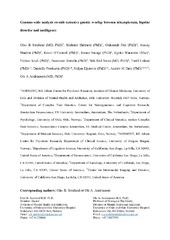Genome-wide analysis reveals extensive genetic overlap between schizophrenia, bipolar disorder, and intelligence
Smeland, Olav Bjerkehagen; Bahrami, Shahram; Frei, Oleksandr; Shadrin, Alexey A.; O'Connell, Kevin; Savage, Jeanne E.; Watanabe, Kyoko; Krull, Florian; Bettella, Francesco; Steen, Nils Eiel; Ueland, Torill; Posthuma, Danielle; Djurovic, Srdjan; Dale, Anders; Andreassen, Ole Andreas
Peer reviewed, Journal article
Accepted version
Permanent lenke
https://hdl.handle.net/1956/20331Utgivelsesdato
2019Metadata
Vis full innførselSamlinger
Originalversjon
https://doi.org/10.1038/s41380-018-0332-xSammendrag
Schizophrenia (SCZ) and bipolar disorder (BD) are severe mental disorders associated with cognitive impairment, which is considered a major determinant of functional outcome. Despite this, the etiology of the cognitive impairment is poorly understood, and no satisfactory cognitive treatments exist. Increasing evidence indicates that genetic risk for SCZ may contribute to cognitive impairment, whereas the genetic relationship between BD and cognitive function remains unclear. Here, we combined large genome-wide association study data on SCZ (n = 82,315), BD (n = 51,710), and general intelligence (n = 269,867) to investigate overlap in common genetic variants using conditional false discovery rate (condFDR) analysis. We observed substantial genetic enrichment in both SCZ and BD conditional on associations with intelligence indicating polygenic overlap. Using condFDR analysis, we leveraged this enrichment to increase statistical power and identified 75 distinct genomic loci associated with both SCZ and intelligence, and 12 loci associated with both BD and intelligence at conjunctional FDR < 0.01. Among these loci, 20 are novel for SCZ, and four are novel for BD. Most SCZ risk alleles (61 of 75, 81%) were associated with poorer cognitive performance, whereas most BD risk alleles (9 of 12, 75%) were associated with better cognitive performance. A gene set analysis of the loci shared between SCZ and intelligence implicated biological processes related to neurodevelopment, synaptic integrity, and neurotransmission; the same analysis for BD was underpowered. Altogether, the study demonstrates that both SCZ and BD share genetic influences with intelligence, albeit in a different manner, providing new insights into their genetic architectures.
